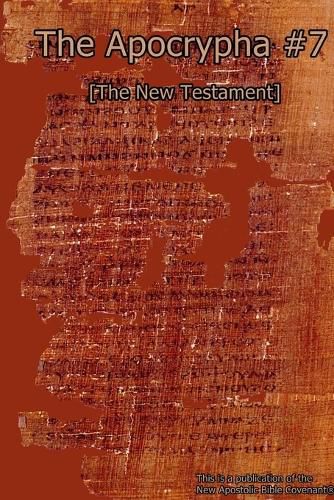Readings Newsletter
Become a Readings Member to make your shopping experience even easier.
Sign in or sign up for free!
You’re not far away from qualifying for FREE standard shipping within Australia
You’ve qualified for FREE standard shipping within Australia
The cart is loading…






This title is printed to order. This book may have been self-published. If so, we cannot guarantee the quality of the content. In the main most books will have gone through the editing process however some may not. We therefore suggest that you be aware of this before ordering this book. If in doubt check either the author or publisher’s details as we are unable to accept any returns unless they are faulty. Please contact us if you have any questions.
The word "apocrypha" means "things put away" or "things hidden" and comes from the Greek through the Latin. The general term is usually applied to the books that were considered by the church as useful, but not divinely inspired. As such, to refer to Gnostic writings as "apocryphal" is misleading since they would not be classified in the same category by orthodox believers. Often used by the Greek Fathers was the term antilegomena, or "spoken against", although some canonical books were also spoken against, such as the Apocalypse of John in the East. Often used by scholars is the term pseudepigrapha, or "falsely inscribed" or "falsely attributed", in the sense that the writings were written by an anonymous author who appended the name of an apostle to his work, such as in the Gospel of Peter or The Ethiopic Apocalypse of Enoch: almost all books, in both Old and New Testaments, called "apocrypha" in the Protestant tradition are pseudepigrapha.
$9.00 standard shipping within Australia
FREE standard shipping within Australia for orders over $100.00
Express & International shipping calculated at checkout
This title is printed to order. This book may have been self-published. If so, we cannot guarantee the quality of the content. In the main most books will have gone through the editing process however some may not. We therefore suggest that you be aware of this before ordering this book. If in doubt check either the author or publisher’s details as we are unable to accept any returns unless they are faulty. Please contact us if you have any questions.
The word "apocrypha" means "things put away" or "things hidden" and comes from the Greek through the Latin. The general term is usually applied to the books that were considered by the church as useful, but not divinely inspired. As such, to refer to Gnostic writings as "apocryphal" is misleading since they would not be classified in the same category by orthodox believers. Often used by the Greek Fathers was the term antilegomena, or "spoken against", although some canonical books were also spoken against, such as the Apocalypse of John in the East. Often used by scholars is the term pseudepigrapha, or "falsely inscribed" or "falsely attributed", in the sense that the writings were written by an anonymous author who appended the name of an apostle to his work, such as in the Gospel of Peter or The Ethiopic Apocalypse of Enoch: almost all books, in both Old and New Testaments, called "apocrypha" in the Protestant tradition are pseudepigrapha.